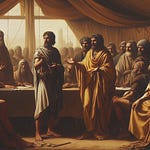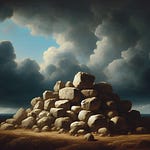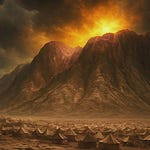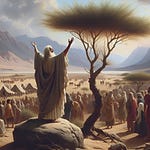Have you ever found yourself wondering why God would lead you to a place that seems barren? In Exodus 17, we see that the Lord sometimes brings us to dry places—not to abandon us, but to reveal the Rock that satisfies and the Banner who saves.
vv. 1–7 - A little under two months have passed since the Exodus and the journey for the Hebrews continues—“according to the commandment of the LORD”—into Rephidim. Once again, there’s no water. This is an opportunity for the people to put recent lessons into practice. Faith, like a muscle, grows through resistance. Unfortunately, we discover that bondage in Egypt has resulted in an atrophy of trust. This time, they do more than grumble—they chide. The murmuring described in Exodus 15 and 16 is more like an under your breath complaint or discontent. But the word translated “chide” in verse 2 implies hostile accusation, not mere complaint. Their sin has moved from an emotional response to a more formal challenge. They essentially charge Moses—and by extension God—with attempted murder. “Wherefore is this that thou hast brought us up out of Egypt, to kill us and our children and our cattle with thirst?” Notice the escalation. First discomfort, then accusation, then attempted stoning. Moses, though discouraged, doesn’t retaliate. He cries unto the Lord. God’s response is both merciful and majestic: ‘Behold, I will stand before thee there upon the rock in Horeb.’ This is astonishing. God does not merely send provision—He positions Himself where judgment will fall. The rock is struck, but God is present there, identifying Himself with the smiting. The rock is to be smitten with the rod of judgment, the same rod used to strike Egypt. And the result? Water flows. Life from judgment. Provision through substitution. The Apostle Paul leaves no doubt in. 1 Corinthians 10—“That Rock was Christ.” He was smitten not for the righteous but for rebels. This is grace on full display—provision flowing from the wounds of a smitten substitute. Moses names the place “Massah” (testing) and “Meribah” (strife). A double reminder. The rock gave water, but the place is designated in a way that reminds the Hebrews of their rebellion. When the people asked, “Is the LORD among us, or not?” it was not an innocent question. It was an accusation against the obvious. The pillar of fire still glowed. The manna still fell. Yet they questioned God’s covenant presence. God gave ample proof that He was caring for them, but a spirit of entitlement tends to move the goalposts and find grounds to accuse.
vv. 8–16 - Freshly rejuvenated, the Israelites find themselves under attack from Amalek. These descendants of Esau, make their move in an unprovoked and opportunistic manner. Moses does not hesitate. Joshua, introduced here for the first time, is tasked with assembling an army. Meanwhile, Moses ascends the hill with the staff of God. But the battle is not merely one of swords. God uses it to communicate truth in a symbolic fashion. When Moses lifts the staff—symbol of God’s power—Israel prevails. When his arms droop, Amalek gains ground. Victory hinges not on technique or tenacity but on trusting God and expressing it in prayer. But Moses cannot sustain this posture on his own. So Aaron and Hur support him, one on each side and as the sun sets, Amalek retreats. They are “discomfited” i.e. weakened and brought low. God then commands that the victory be recorded and promises to utterly extinguish the Amalekites at some point. Moses then builds an altar and names the place “Jehovah-Nissi” i.e. The LORD is my banner. A banner refers to some kind of pole raised, sometimes with an emblem on the top, around which the people were to gather and move. The raised rod becomes more than a staff. It is a rallying point. A reminder that every victory belongs to God.
Application
Christ is the Rock willing to be smitten in the place of sinners. Israel didn’t deserve water. And their accusations only proved that fact. But Christ did not come into this world for the deserving, but for the desperate, and was “wounded for our transgressions.” Are you spiritually parched today? The answer is found in Christ, the Rock of God’s provision. Do not ask, “Is the LORD among us?” Acknowledge that God sent His Son and say, praise God He was smitten for me.
Sinners can be so bold as to put God in the dock and pass sentence on Him. As noted, the act of chiding is not mere frustration, it is formal rebellion. The Israelites display carnal anger and entitlement, and since they can't kill God, they come near to stoning Moses. This is akin to the red-faced anger sometimes seen in a grounded teenager, or an adult under authority who doesn't get their way. This is not the spirit of Christ. And if you can, give wide berth to those who act like this. Their words may sound spiritual, but their hearts are hardened. Chiding is contagious—and the Lord takes it seriously. Don’t mimic them. Avoid them. And pray to be kept from that spirit.
The church goes forward under intercessory work of their Mediator. The battle with Amalek wasn’t won by swords alone. It was won on the hill in prayer, with Moses the mediator functioning as a type of Christ. However, types have limitations in order to teach us that there’s only one who is perfect—Christ doesn’t need the support of others. Thus, the Lord’s army is to go forward in the confidence of Christ’s intercession. When the enemy attacks, go to your interceding Priest and hide in Him for refuge.
Life is an endless series of battles. Amalek was not annihilated that day, and they would get the better of the Israelites who tried to enter Canaan after the events of Kadesh-Barnea. This illustrates the Christian life. Conversion does not kill the flesh—it awakens a battle between the flesh and the Spirit. Young believer, do not grow weary with the battle. The fight is a sign of life. Like the Amalekites, God will eventually destroy them altogether. Until then, you must fight. You must mortify the deeds of the flesh—not once, but daily. Not occasionally, but relentlessly. The cross is not an invitation to comfort—it is a call to crucify the flesh.
The believer’s banner is the Lord. Moses didn’t raise a national flag or shout slogans of ethnic pride. There may be a context where such things are not problematic, but sometimes faith gets lost in bravado. This narrative explains the hope of the people of God. Our banner is not our gifts or our grit. It is the person and work of Christ. See Him in this chapter, first smitten for our sins, and then ever living to make intercession for us. Are you under the banner of Christ? Have you left the enemy and joined the Lord’s army? If not, why not do so today?
“Young Christian, you have begun a life of warfare, rest assured of that. You would never be told to endure hardness as a good soldier of Jesus Christ if it were not so. You must not put that sword up into its scabbard, but rather grind it sharp and hold it always ready in your hand. Watch constantly, and pray without ceasing, for till you get your foot upon the golden pavement of the New Jerusalem, you must wear a warrior’s harness and bear a warrior’s toils.” — Charles Spurgeon










